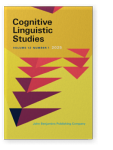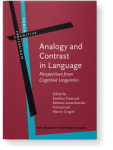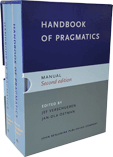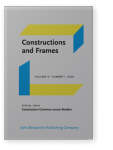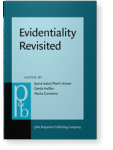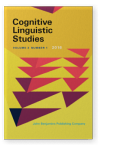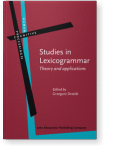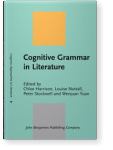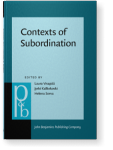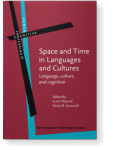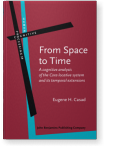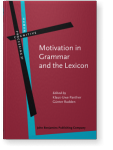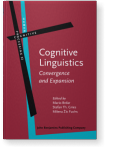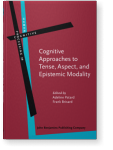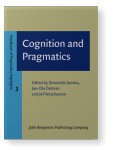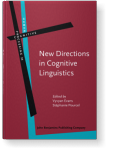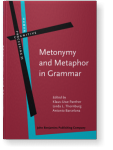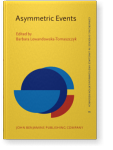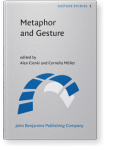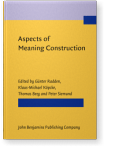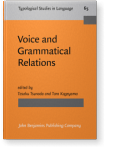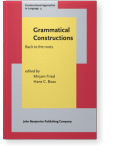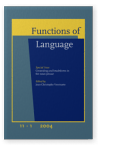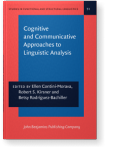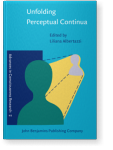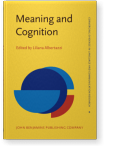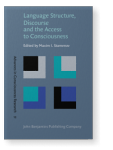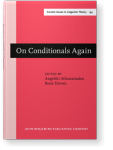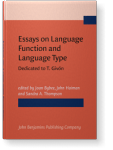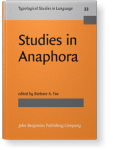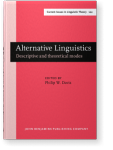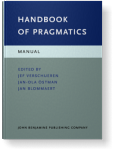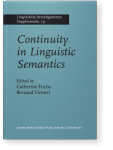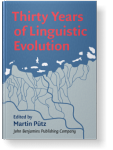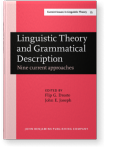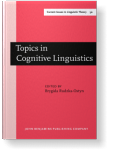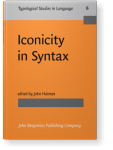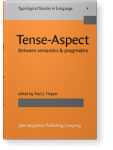Ronald W. Langacker
List of John Benjamins publications for which Ronald W. Langacker plays a role.
Journal
2022 Chapter 1. What could be more fundamental? Analogy and Contrast in Language: Perspectives from Cognitive Linguistics, Krawczak, Karolina, Barbara Lewandowska-Tomaszczyk and Marcin Grygiel (eds.), pp. 15–46 | Chapter
Contrast and analogy are viewed in the context of a much larger picture. They are traced back to an essential feature of living organisms: their constant engagement in energy-driven activity responsible for maintenance and growth. Structure and regularity inhere in the organization imposed by… read more
2022 Cognitive grammar Handbook of Pragmatics: Manual, Verschueren, Jef and Jan-Ola Östman (eds.), pp. 171–177 | Chapter
2020 Trees, assemblies, chains, and windows Construction Grammar across Borders, Torrent, Tiago Timponi, Ely Edison da Silva Matos and Natália Sathler Sigiliano (eds.), pp. 8–55 | Article
For describing grammatical organization, metaphors based on a variety of source domains – including trees, networks, chains, paths, and windows – all appear to have some validity. In Cognitive Grammar, they pertain to facets of assemblies, where semantic and phonological structures are connected… read more
2017 Grounding, semantic functions, and absolute quantifiers Grammar, usage and discourse: Functional studies offered to Kristin Davidse, Vandelanotte, Lieven, Wout Van Praet and Lieselotte Brems (eds.), pp. 233–248 | Article
Absolute quantifiers (e.g. many, few, three) have adjectival uses, but when initial they function as grounding elements: like demonstratives, articles, and relative quantifiers (e.g. all, most, every), they indicate the epistemic status of the nominal referent. This ambivalence is due to their… read more
2017 Evidentiality in Cognitive Grammar Evidentiality Revisited: Cognitive grammar, functional and discourse-pragmatic perspectives, Marín-Arrese, Juana I., Gerda Haßler and Marta Carretero (eds.), pp. 13–55 | Article
A clause serves the intersubjective function of presenting and negotiating a proposition. It both describes an occurrence and gives some indication of its epistemic status. The latter consists primarily in an assessment of whether the occurrence is realized, but may also include the basis for this… read more
2016 Nominal grounding and English quantifiers Cognitive Linguistic Studies 3:1, pp. 1–31 | Article
The Cognitive Grammar analysis of English nominal quantifiers is re-examined in light of recent theoretical developments: the characterization of grammar as the implementation of semantic functions; and the recognition of strata — baseline and levels of elaboration — as a dimension of structural… read more
2016 Toward an integrated view of structure, processing, and discourse Studies in Lexicogrammar: Theory and applications, Drożdż, Grzegorz (ed.), pp. 23–54 | Article
Research in Cognitive Grammar divides into two broad phases. The first phase provided an integrated account of lexicon, morphology, and syntax as inherently meaningful structures; it offered a radical alternative to the generative paradigm based on modularity, constituency, and the autonomy of… read more
2014 Foreword Cognitive Grammar in Literature, Harrison, Chloe, Louise Nuttall, Peter Stockwell and Wenjuan Yuan (eds.), pp. xiii–xiv | Foreword
2014 Subordination in a dynamic account of grammar Contexts of Subordination: Cognitive, typological and discourse perspectives, Visapää, Laura, Jyrki Kalliokoski and Helena Sorva (eds.), pp. 17–72 | Article
Subordination is no exception to the rule that basic and general notions are the hardest to characterize. There is in fact no guarantee that it represents a single or unified phenomenon. Rather than a definition, my immediate goal is thus to elucidate and clarify the numerous factors involved. I… read more
2012 9. Linguistic manifestations of the space-time (dis)analogy Space and Time in Languages and Cultures: Language, culture, and cognition, Filipović, Luna and Katarzyna M. Jaszczolt (eds.), pp. 191–216 | Article
As facets of interpreted experience, space and time are highly variable in their linguistic manifestation. Universal aspects of language structure reflect a more basic level of apprehension. Space and time have a foundational role in grammar. Objects and events, the prototypes for nouns and verbs,… read more
2012 Introduction From Space to Time: A cognitive analysis of the Cora locative system and its temporal extensions, Casad, Eugene H., pp. 1–4 | Chapter
2011 Semantic motivation of the English auxiliary Motivation in Grammar and the Lexicon, Panther, Klaus-Uwe and Günter Radden (eds.), pp. 29–48 | Article
Motivation offers a viable middle ground to extreme positions that are clearly untenable. Here I consider the semantic motivation of grammar, as exemplified by the English auxiliary. Properly characterized in terms of systems of elements serving particular semantic functions, the auxiliary is seen… read more
2011 On the subject of impersonals Cognitive Linguistics: Convergence and Expansion, Brdar, Mario, Stefan Th. Gries and Milena Žic Fuchs (eds.), pp. 179–218 | Article
In accordance with basic principles of Cognitive Grammar, impersonal it (e.g. It’s obvious that he’s angry) is claimed to be meaningful. Three avenues of approach are followed in the characterization of it and the constructions it appears in: a comparison with related constructions; a comparison to… read more
2011 The English present: Temporal coincidence vs. epistemic immediacy Cognitive Approaches to Tense, Aspect, and Epistemic Modality, Patard, Adeline and Frank Brisard (eds.), pp. 45–86 | Article
Two accounts of the English present are outlined and compared: one that treats it as tense, indicating coincidence with the time of speaking; and one that treats it as modality, indicating epistemic immediacy. Well-known problems with a time-based account are overcome in a conceptual semantic… read more
2011 Convergence in cognitive linguistics Cognitive Linguistics: Convergence and Expansion, Brdar, Mario, Stefan Th. Gries and Milena Žic Fuchs (eds.), pp. 9–16 | Article
In contrast to the generative tradition, the overall tendency in cognitive linguistics has been convergent rather than divergent. At the outset it was quite diverse, as it did not stem from any single theory, scholar, or object of description. The passing years have seen the recognition of common… read more
2009 Cognitive grammar Cognition and Pragmatics, Sandra, Dominiek, Jan-Ola Östman and Jef Verschueren (eds.), pp. 78–85 | Article
2009 Constructions and constructional meaning New Directions in Cognitive Linguistics, Evans, Vyvyan and Stéphanie Pourcel (eds.), pp. 225–267 | Article
2009 Metonymic grammar Metonymy and Metaphor in Grammar, Panther, Klaus-Uwe, Linda L. Thornburg and Antonio Barcelona (eds.), pp. 45–71 | Article
2008 7. Subordination in Cognitive grammar Asymmetric Events, Lewandowska-Tomaszczyk, Barbara (ed.), pp. 137–149 | Article
This paper reexamines the treatment of subordination in Cognitive Grammar. Subordination is not susceptible to simple, categorical description. Understanding it requires the elucidation of numerous factors, with respect to which one can describe its many types, distinguish them from one another,… read more
2008 Metaphoric gesture and cognitive linguistics Metaphor and Gesture, Cienki, Alan and Cornelia Müller (eds.), pp. 249–251 | Article
2007 Constructing the meanings of personal pronouns Aspects of Meaning Construction, Radden, Günter, Klaus-Michael Köpcke, Thomas Berg and Peter Siemund (eds.), pp. 171–187 | Article
The meanings of personal pronouns are described using basic notions of Cognitive Linguistics. Among these notions are subjective vs. objective construal, profiling, grounding, intersubjectivity, paths of mental access, and conceptual blending. Pronouns are situated with respect to other strategies… read more
2006 Dimensions of defocusing Voice and Grammatical Relations: In Honor of Masayoshi Shibatani, Tsunoda, Tasaku and Taro Kageyama (eds.), pp. 115–137 | Article
2005 7. Integration, grammaticization, and constructional meaning Grammatical Constructions: Back to the roots, Fried, Mirjam and Hans C. Boas (eds.), pp. 157–189 | Chapter
2004 Remarks on nominal grounding Grounding and headedness in the noun phrase, Verstraete, Jean-Christophe (ed.), pp. 77–113 | Article
The problems posed by nominal structure and nominal reference are notoriously subtle and complex. Though fairly extensive, their treatment in Cognitive Grammar (CG) has thus far been partial, preliminary, and scattered in numerous publications. The synthesis attempted here can hardly overcome the… read more
2004 Form, meaning, and behavior: The Cognitive Grammar analysis of double subject constructions Cognitive and Communicative Approaches to Linguistic Analysis, Contini-Morava, Ellen, Robert S. Kirsner and Betsy Rodríguez-Bachiller (eds.), pp. 21–60 | Article
2003 Extreme subjectification: English tense and modals Motivation in Language: Studies in honor of Günter Radden, Cuyckens, Hubert, Thomas Berg, René Dirven † and Klaus-Uwe Panther (eds.), pp. 3–26 | Article
2002 10. The limits of continuity: Discreteness in cognitive semantics Unfolding Perceptual Continua, Albertazzi, Liliana (ed.), pp. 241–254 | Chapter
2000 Why a mind is necessary: Conceptualization, grammar and linguistic semantics Meaning and Cognition: A multidisciplinary approach, Albertazzi, Liliana (ed.), pp. 25–38 | Chapter
This opening essay delineates the conceptual structure of cognitive linguistics and provides a reference framework for the other essays, which address and develop particular aspects of the theory. The two principal conceptual points emphasised by the author are the non-reducibility of linguistic… read more
1997 Consciousness, Construal, and Subjectivity Language Structure, Discourse and the Access to Consciousness, Stamenov, Maxim I. (ed.), pp. 49–76 | Article
1997 Generics and habituals On Conditionals Again, Athanasiadou, Angeliki and René Dirven † (eds.), pp. 191–222 | Article
1997 A Dynamic Account of Grammatical Function Essays on Language Function and Language Type: Dedicated to T. Givón, Bybee, Joan L., John Haiman and Sandra A. Thompson (eds.), pp. 249–274 | Article
1996 Conceptual Grouping and Pronominal Anaphora Studies in Anaphora, Fox, Barbara A. (ed.), pp. 333–378 | Article
1995 Viewing in cognition and grammar Alternative Linguistics: Descriptive and theoretical modes, Davis, Philip W. (ed.), pp. 153–212 | Article
1995 Cognitive grammar Handbook of Pragmatics: Manual, Verschueren, Jef, Jan-Ola Östman and Jan Blommaert † (eds.), pp. 105–111 | Article
1994 Culture, cognition, and grammar Language Contact and Language Conflict, Pütz, Martin (ed.), pp. 25–53 | Article
1994 The limits of continuity: discreteness in cognitive semantics Continuity in Linguistic Semantics, Fuchs, Catherine and Bernard Victorri (eds.), pp. 9–20 | Article
1992 The symbolic nature of cognitive grammar: The meaning of of and of of-periphrasis Thirty Years of Linguistic Evolution: Studies in honour of René Dirven on the occasion of his 60th birthday, Pütz, Martin (ed.), pp. 483–502 | Article
1991 8. Cognitive Grammar Linguistic Theory and Grammatical Description: Nine Current Approaches, Droste, Flip G. and John E. Joseph (eds.), pp. 275–306 | Chapter
1988 A view of linguistic semantics Topics in Cognitive Linguistics, Rudzka-Ostyn, Brygida (ed.), pp. 49–90 | Article
1988 An overview of cognitive grammar Topics in Cognitive Linguistics, Rudzka-Ostyn, Brygida (ed.), pp. 3–48 | Article
1988 A usage-based model Topics in Cognitive Linguistics, Rudzka-Ostyn, Brygida (ed.), pp. 127–164 | Article
1988 The nature of grammatical valence Topics in Cognitive Linguistics, Rudzka-Ostyn, Brygida (ed.), pp. 91–126 | Article
1985 Observations and speculations on subjectivity Iconicity in Syntax: Proceedings of a symposium on iconicity in syntax, Stanford, June 24–26, 1983, Haiman, John (ed.), pp. 109–150 | Article
1982 Remarks on English Aspect Tense-Aspect: Between semantics & pragmatics, Hopper, Paul J. (ed.), pp. 265–304 | Article
